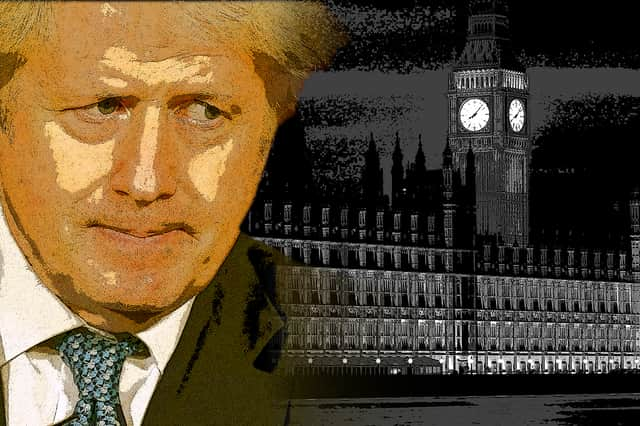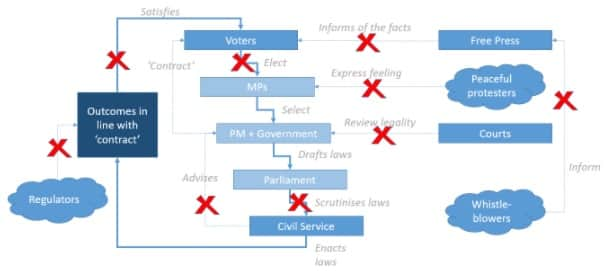A new kind of government? How Boris Johnson and his Cabinet are attempting to dismantle democracy


This article contains affiliate links. We may earn a small commission on items purchased through this article, but that does not affect our editorial judgement.
This is the third of a three-part series from Mark E Thomas, founder of The 99% Organisation, who looks at how the Boris Johnson government is different from and more dangerous than any previous government in the UK.
Last time, he looked at how, despite the rhetoric, this government has no policies for levelling up.
Advertisement
Hide AdAdvertisement
Hide AdIn this, the final piece in our series on Malice in Plunderland – a New Kind of Government? – Mark will look at how, unlike previous UK governments, the Johnson government has no attachment to democracy – and is, in fact, attempting to dismantle it.
Malice in Plunderland, part 3: Dismantling Democracy
Most governments follow Winston Churchill’s line that:
“Democracy is the worst form of government – except all those other forms that have been tried from time to time.”
However, many members of today’s cabinet are market fundamentalists who believe that ‘mass democracy’ amounts to nothing less than oppression of the ultra-wealthy.
This government has been systematic in its efforts to dismantle all democratic safeguards. In Bills including the Internal Market Bill; the Police, Crime, Sentencing and Courts Bill; the Elections Bill; the Judicial Review and Courts Bill and others, they have reduced or plan to reduce almost every check or balance in our democratic system:
• the right to vote;
• the right to peaceful protest
• Parliamentary scrutiny
• safeguards on whistle-blowers who expose wrongdoing;
Advertisement
Hide AdAdvertisement
Hide Ad• the independence of regulators, such as the electoral commission
• the ability of the courts to review the legality of government actions
Taken together, the picture looks something like this: almost every safeguard is being dismantled.


Let’s look at these in turn.
Voters
Voters have been a check on government, but this government plans to make it harder for people to vote them out by changing boundaries to give 13 more Conservative seats and 8 fewer Labour seats (per Electoral Calculus) and by requiring Voter-ID, even though ‘voter fraud’ is extremely rare.
Advertisement
Hide AdAdvertisement
Hide AdThis will disenfranchise many younger and poorer people (who are less likely to vote Conservative) without ID like driving licences and passports.
The Elections Bill also affects opposition parties’ ability to campaign as:
“… it imposes limits on groups, unions, charities and even individuals doing anything considered to be “intended to achieve a common purpose”. This … could exclude charities and voluntary groups from the electoral process and make it impossible for political parties with broad bases of support to organise effectively.”
Peaceful protest
Our right to peaceful protest is enshrined in the Human Rights Act. But our government is, via the Police, Crime, Sentencing and Courts Bill, effectively removing the right to protest. If the Police believe that any individual or organisation nearby might be disturbed or feel threatened by the noise of the protest, they can ban it.
Advertisement
Hide AdAdvertisement
Hide AdThe Bill widens the definition of protest to include one-person protests, and it lowers the burden of proof on the state to show that demonstrators were knowingly non-compliant with restrictions that have been announced. It makes it possible to ban demonstrations because a person “is put at risk of suffering” any disruption – including noise – which means that no offence need even have occurred to ban the demonstration. And the maximum penalty for non-compliance is 10 years.
The UK is at grave risk of becoming a rare country in Europe without a right to peaceful protest.
Parliamentary scrutiny
The sovereignty of the UK Parliament is almost universally held as a vital principle. But:
“On 28 August 2019, the Parliament of the United Kingdom was ordered to be prorogued by Queen Elizabeth II upon the advice of the Conservative prime minister, Boris Johnson, advice later ruled to be unlawful.” Source: Wikipedia
Advertisement
Hide AdAdvertisement
Hide AdThe reason for proroguing Parliament was to avoid Parliamentary scrutiny of Johnson’s plan to leave the EU without an agreed deal on October 31, 2019.
Without judicial review, there would have been no Parliamentary scrutiny of this plan despite the fact that it was clearly a contentious issue of vital importance to the future of the UK.
Courts
The case went to the Supreme Court, which found the prorogation was both justiciable and unlawful, and therefore null and of no effect.
The court ruled that any prorogation would be unlawful “if it has the effect of frustrating or preventing, without reasonable justification, the ability of Parliament to carry out its constitutional functions as a legislature.”
Advertisement
Hide AdAdvertisement
Hide AdThis is a clear demonstration of the value of judicial review.
Unfortunately, the government did not see it that way and the Conservative manifesto made clear that they would like to restrict the ability of courts to review government decisions:
“We will ensure that judicial review is available to protect the rights of the individuals against an overbearing state, while ensuring that it is not abused to conduct politics by another means or to create needless delays.”
And indeed, the government is now planning to curtail the power of the courts to review decisions made by the executive on grounds that there is:
Advertisement
Hide AdAdvertisement
Hide Ad“a growing tendency for the courts in Judicial Review cases to edge away from a strictly supervisory jurisdiction … The reasoning of decision makers has been replaced, in essence, with that of the court. We should strive to create and uphold a system which avoids drawing the courts into deciding on merit or moral values issues which lie more appropriately with the executive or Parliament.”
In reality, the government has been frustrated by a series of judicial reviews - on issues from the illegal proroguing of Parliament to the refusal to publish information on potentially corrupt PPE deals - which have gone against the government. They would like to prevent such interference in the future. This ‘interference’ is, however, a vital safeguard for UK democracy.
Whistle-blowers
The all-party Parliamentary group on whistleblowing concluded,
“…it is time for a root and branch reform of the legislation … including the introduction of a body capable of tackling and challenging wrong-doing.”
Advertisement
Hide AdAdvertisement
Hide AdRegulatory review
Perhaps the most important regulator for protecting democracy is the Electoral Commission. The Commission is in the government’s sights because it concluded that there were irregularities in the Brexit referendum, and this finding is hugely embarrassing to the government.
Although the Vote Leave campaign has protested its innocence, the courts did not agree, and the campaign was fined.
Nonetheless, the government is considering options up to and including abolition of the Electoral Commission. As Cat Smith, Labour’s shadow Cabinet Office minister, commented,
“[this is] a harmful and worrying step for the integrity of our democracy. Removing the Electoral Commission is just one part of a concerted strategy by the Tories to remove scrutiny and proper accountability. Without the Electoral Commission, no one could prevent the Tories from introducing policies that fundamentally make it harder for people to vote, such as mandatory Voter ID.”
Advertisement
Hide AdAdvertisement
Hide AdIn summary, we have had a reasonably effective system of checks and balances, but we cannot be complacent about the future: either these checks and balances have already been weakened or they are currently under threat.
If the government succeeds, the UK will become a ‘managed democracy’ retaining the façade of democratic institutions but with none of the substance.
Conclusion
The Johnson government is different from any previous UK government of left or right.
An undemocratic party set on dismantling democracy and building a plunder state is something so alien to the UK that it is hard for commentators and voters to accept that it is happening, and there is little commentary and little action to prevent it.
Advertisement
Hide AdAdvertisement
Hide AdIf we wait until the Health and Care Bill is enacted and the Police, Crime, Sentencing and Courts Bill, the Elections Bill, Judicial Review and Courts Bill have passed into law, it will be too late to save either the NHS or British democracy.
A message from the editor:
Thank you for reading. NationalWorld is a new national news brand, produced by a team of journalists, editors, video producers and designers who live and work across the UK. Find out more about who’s who in the team, and our editorial values. We want to start a community among our readers, so please follow us on Facebook, Twitter and Instagram, and keep the conversation going.
Comment Guidelines
National World encourages reader discussion on our stories. User feedback, insights and back-and-forth exchanges add a rich layer of context to reporting. Please review our Community Guidelines before commenting.
